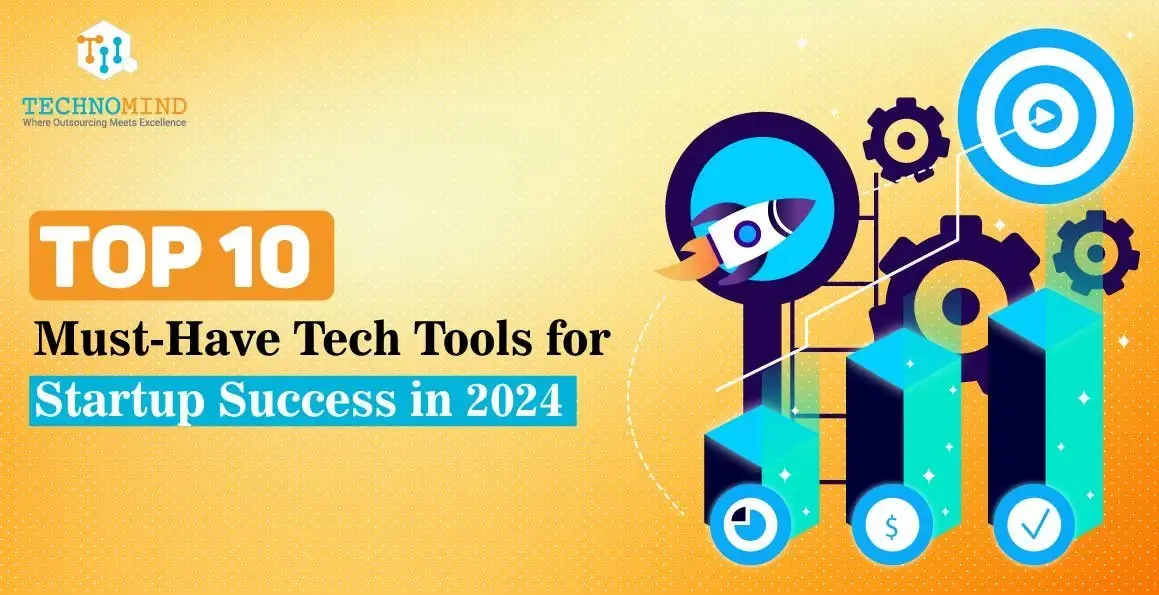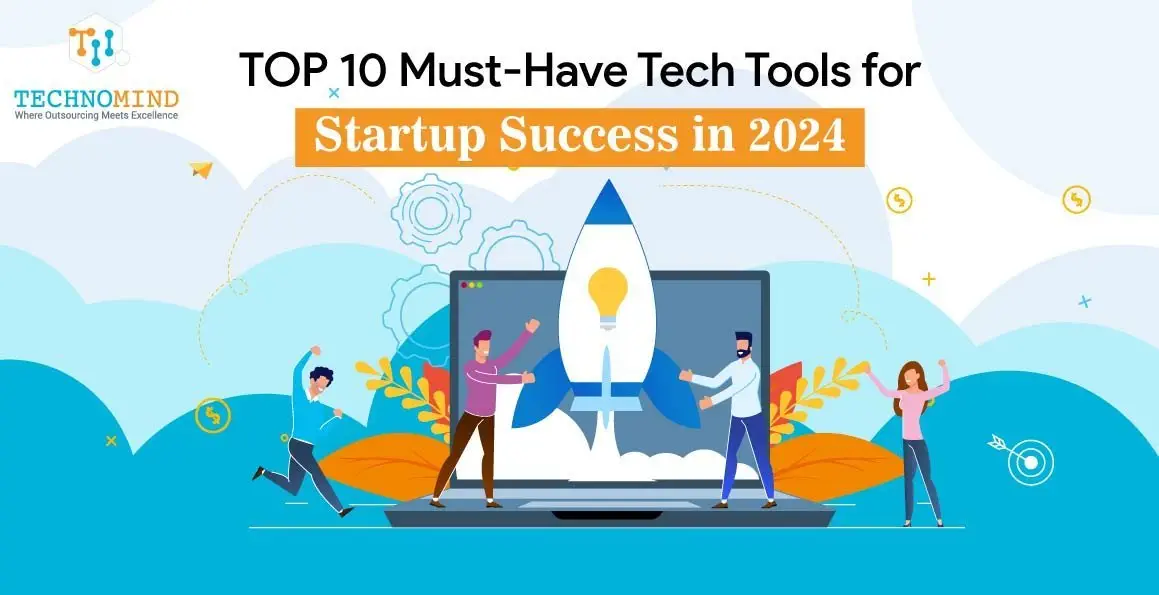Blog
Top 10 Must-Have Tech Tools for Startup Success in 2024
Starting a business is like sailing over unknown waters; it’s thrilling, uncertain, and full of obstacles. In a world where technological innovations shape the destiny of businesses, one burning question echoes: Are you arming your startup with the right tech arsenal to not just survive but conquer in 2024?
What if your startup had access to a magic wand of technological tools that could turn obstacles into opportunities and make dreams come true? Buckle up as we reveal the top 10 enchanted tech tools that can be the key to the success of your startup business.
So, Get Ready to decode the future and amplify your startup’s journey. Let’s get into the depth of tech driven waters of startup world.
Importance of Tech Tools for StartUps
The value of tech tools for startups cannot be overstated. These resources offer startups a multitude of benefits that are essential to their development and form the foundation of operational excellence. Tech solutions enable startups to overcome obstacles and seize opportunities, from increasing productivity through work automation to guaranteeing financial transparency with sophisticated accounting software.
Here are a few points which let us understand how and why tech tools are important for startups in 2024.
- Efficiency Boost: Automation of repetitive tasks enhances operational efficiency.
- Cost Optimization: Streamlined processes lead to significant cost savings for startups.
- Data-Driven Decisions:Analytics tools offer insights crucial for informed decision-making.
- Global Accessibility: Cloud computing ensures ubiquitous access to essential resources.
- Competitive Edge: Adoption of cutting-edge tools positions startups favorably in the market.
- Scalability: Tech tools facilitate seamless growth and scalability as startups evolve.
- Enhanced Collaboration: Communication tools foster real-time collaboration among remote teams.
- Customer-Centric Approach: CRM software aids in building and maintaining strong customer relationships.
- Cybersecurity Protection: Robust cybersecurity tools safeguard sensitive data against potential threats.
- Financial Transparency: Financial management software ensures accurate and transparent financial reporting.
- Time Efficiency: Automation tools reduce manual work, allowing startups to focus on core activities.
- Strategic Marketing: Marketing automation platforms enable targeted and personalized campaigns.
- Compliance Management: HR software assists in maintaining compliance with regulations.
- Innovation Catalyst: Technology tools empower startups to innovate and stay ahead in the market.
Top 10 Tech Tools for StartUps to Use in 2024
AI-Powered Project Management Tool
Features:
- Intelligent Task Allocation: Utilizes AI algorithms to allocate tasks based on team members’ strengths and workload.
- Predictive Analytics: Anticipates potential project roadblocks and provides proactive solutions.
- Real-time Collaboration: Enhances team collaboration with instant updates, facilitating seamless communication.
Benefits:
- Efficient Resource Utilization: Maximizes team efficiency by assigning tasks intelligently.
- Proactive Issue Resolution: Identifies and resolves issues before they impact project timelines.
- Streamlined Communication: Real-time collaboration reduces delays and enhances project speed.
- Data-Driven Decision-Making: Leverages analytics for data-driven insights into project performance.
- Improved Task Prioritization: Helps in prioritizing tasks based on their impact on project milestones.
Blockchain-Based Financial Management Software
Features:
- Immutable Ledger: Utilizes blockchain to create an unalterable record of financial transactions.
- Smart Contracts: Automates financial processes with self-executing smart contracts.
- Decentralized Security: Enhances security by decentralizing financial data storage.
Benefits:
- Transparent Transactions: Provides a transparent and traceable ledger of financial activities.
- Reduced Fraud Risk: Smart contracts minimize the risk of fraudulent financial activities.
- Cost-Efficient Processes: Automation reduces the costs associated with manual financial management.
- Enhanced Security: Decentralized storage enhances data security and reduces vulnerability.
- Improved Auditability: Facilitates easy auditing with an immutable record of financial transactions.
Augmented Reality (AR) Customer Support Platform
Features:
- Remote Assistance: Enables technicians to provide support remotely through AR visualization.
- Interactive Troubleshooting Guides: Provides step-by-step AR guides for customers to troubleshoot issues.
- Real-time Collaboration: Allows instant collaboration between support teams and customers.
Benefits:
- Faster Issue Resolution: Remote assistance accelerates problem-solving, reducing downtime.
- Enhanced Customer Experience: Interactive guides improve customer satisfaction.
- Reduced On-Site Visits: AR support minimizes the need for on-site technician visits.
- Cost Savings: Decreases support costs associated with travel and on-site services.
- Improved First-Time Resolution Rate: Real-time collaboration leads to quicker issue resolution on the first attempt.
Chatbot-Powered Customer Engagement Platform
Features:
- Natural Language Processing (NLP): Understands and responds to customer queries in natural language.
- Personalized Recommendations: Analyzes customer behavior to offer tailored product or service suggestions.
- Multi-Channel Integration: Seamlessly integrates with various communication channels for consistent customer engagement.
Benefits:
- 24/7 Customer Support: Chatbots provide round-the-clock assistance, improving customer service availability.
- Increased Efficiency: Automates routine customer interactions, freeing up human agents for complex issues.
- Data-Driven Insights: Analyzes customer interactions to gather valuable insights for business improvement.
- Enhanced Customer Satisfaction: Personalized recommendations enhance the overall customer experience.
- Cost-Effective Support: Reduces the need for a large customer support team, leading to cost savings.
3D Printing Prototyping Tool
Features:
- Rapid Prototyping: Creates physical prototypes quickly for product testing and validation.
- Customization Capabilities: Allows the production of customized prototypes tailored to specific requirements.
- Material Diversity: Supports a variety of materials for prototyping, including plastics, metals, and composites.
Benefits:
- Accelerated Product Development: Rapid prototyping speeds up the product development cycle.
- Cost-Effective Testing: Reduces costs associated with traditional prototyping methods.
- Iterative Design: Enables quick iterations and improvements based on real-world testing.
- Customized Solutions: Supports the creation of prototypes tailored to individual client needs.
- Reduced Time to Market: Streamlines the product development process, leading to faster market entry.
IoT-Enabled Supply Chain Management System
Features:
- Real-Time Tracking: Monitors the movement of goods and assets throughout the supply chain in real-time.
- Predictive Maintenance: Anticipates equipment failures and schedules maintenance to prevent disruptions.
- Data Analytics: Analyzes supply chain data to optimize processes and identify efficiency improvements.
Benefits:
- Improved Visibility: Real-time tracking enhances visibility into the entire supply chain.
- Reduced Downtime: Predictive maintenance minimizes equipment downtime and extends lifespan.
- Cost Optimization: Data analytics identifies cost-saving opportunities and process efficiencies.
- Enhanced Decision-Making: Data-driven insights enable better decision-making in supply chain management.
- Mitigated Risks: Proactively addresses potential issues, reducing the risk of disruptions.
Virtual Reality (VR) Employee Training Platform
Features:
- Immersive Simulations: Creates realistic training scenarios for hands-on learning.
- Interactive Modules: Engages employees through interactive training modules.
- Performance Analytics: Monitors employee performance and identifies areas for improvement.
Benefits:
- Enhanced Learning Retention: Immersive simulations improve information retention and application.
- Cost-Efficient Training: Reduces costs associated with traditional training methods.
- Flexible Training Environments: Allows training in diverse environments without physical constraints.
- Realistic Skill Development: Provides practical, job-relevant training experiences.
- Adaptive Learning Paths: Adjusts training based on individual employee performance.
Automated Social Media Marketing Tool
Features:
- Scheduled Posting: Plans and schedules social media posts for optimal timing.
- Audience Segmentation: Targets specific audience segments with personalized content.
- Performance Analytics: Analyzes social media metrics to measure campaign effectiveness.
Benefits:
- Consistent Brand Presence: Scheduled posting ensures a regular and consistent social media presence.
- Increased Engagement: Audience segmentation delivers content tailored to specific interests.
- Time Savings: Automation reduces the time and effort spent on manual social media management.
- Data-Driven Strategy: Performance analytics guide strategic adjustments for better campaign outcomes.
- Wider Reach: Targeted campaigns reach a larger and more relevant audience.
Machine Learning-Powered Customer Feedback Analysis Tool
Features:
- Sentiment Analysis: Determines the sentiment behind customer feedback.
- Trend Identification: Identifies recurring themes and trends in customer comments.
- Customizable Dashboards: Allows users to create personalized dashboards for feedback analysis.
Benefits:
- Actionable Insights: Sentiment analysis provides insights for actionable improvements.
- Proactive Issue Resolution: Identifies emerging issues before they escalate.
- Customer-Centric Decision-Making: Trends guide decisions for customer-centric improvements.
- Enhanced Product Development: Feedback analysis informs product enhancements and innovations.
- Brand Reputation Management: Monitors and manages brand reputation based on customer sentiments.
Robotic Process Automation (RPA) for HR Processes
Features:
- Automated Onboarding: Streamlines employee onboarding processes with RPA.
- Payroll Automation: Automates payroll calculations and processing.
- Leave Management: Manages employee leave requests and approvals through automation.
Benefits:
- Efficient Onboarding: Accelerates the onboarding of new employees with automated processes.
- Error Reduction: Automation minimizes errors in payroll processing and leave management.
- Time Savings: Frees up HR staff from routine administrative tasks for strategic activities.
- Compliance Adherence: Ensures adherence to HR policies and regulatory requirements.
- Improved Employee Experience: Streamlined processes contribute to a positive employee experience.
Conclusion
2024 will see entrepreneurs navigating the global market, and using cutting-edge tech tools will be critical to their success. These tools are not just cutting edge, but also vital, ranging from project management powered by AI to financial management bolstered by blockchain and immersive virtual reality instruction. They enable new businesses to increase productivity, simplify processes, and maintain an advantage in cutthroat marketplaces.
Adopting the revolutionary potential of these digital technologies in 2024, will enable companies to flourish and pave the way for a time where success and innovation go hand in hand.
The strategic use of these technological wonders will pave the path for growth, resilience, and a competitive advantage in the business sector, which will be essential for startup success in 2024.
AI for Small Businesses and StartUps: What, Why and How?
Artificial intelligence (AI) is a subtle hero in the bustle of modern business that is changing the rules for startups and small businesses. It’s more than just a fancy tech term—consider…
Role of AI in eCommerce Business
From personalized product recommendations to real-time customer support, the eCommerce realm has undergone a profound metamorphosis, seamlessly blending the boundaries…
What Are Data Clean Rooms And How Its Useful For Cookieless Retargeting?
In order to display tailored adverts, implement frequency capping, evaluate the effectiveness of campaigns, and carry…





0 Comments